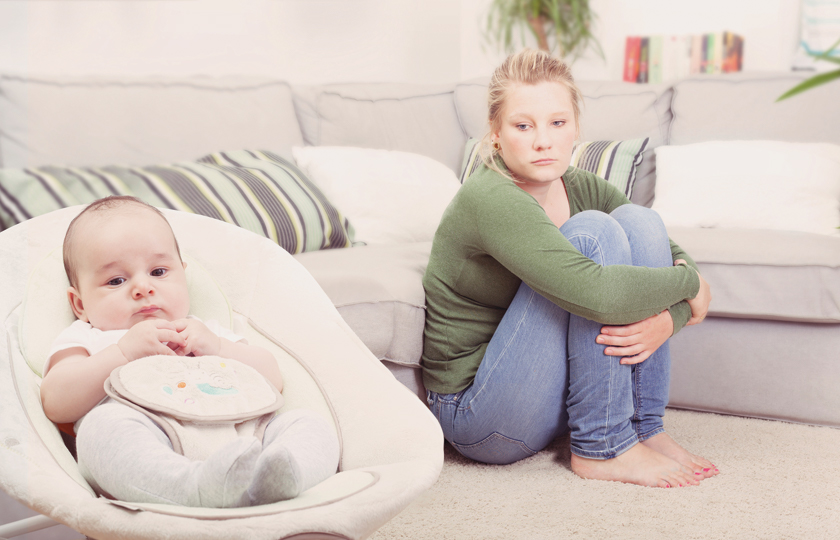These terms have been liberally used interchangeably or as if they were the same mainly because they share similar symptoms or manifestations. However, it is important to know the distinctions between the two in order to properly address these conditions.
This article aims to help eradicate the stigma attached to any of the mental health effects of pregnancy and at the same time provide comfort to all new mothers out there by educating them of the vital information they need to know on both baby blues and postpartum depression.
Baby Blues
This condition is characterized by extreme mood swings such as crying for no particular reason, anxiety, sadness and irritability. This is primarily caused by the fluctuation of hormone levels after childbirth. It is usually further aggravated by stress, change in routine and sleep deprivation that a new mom experiences especially when at the stage of learning the ropes of taking care of a newborn.
However, Baby Blues are completely normal as about 50 to 85 percent of women who give birth experience this condition which can last from 2 hours up to 2 weeks.
Postpartum Depression (PPD)
On the other hand, PPD is a set of complex changes that happens to a woman behaviorally, physically and emotionally. Among the most common symptoms are the feeling of overwhelming guilt or worthlessness, inability to bond with partner and baby, and too much anxiety of something bad happening to the baby. This condition affects about 14 percent of the women worldwide and can start setting in a few weeks to a year after giving birth; meaning the baby maybe almost a year old and the PPD can just be starting to kick in.
The Difference Between Baby Blues and Postpartum Depression
The main difference between the two is that, baby blues naturally come and go without the need for treatment, while PPD-inflicted mothers need professional help to assist them in addressing the immediate problems such as sleep deprivation and appetite as well as the more complicated issues for some cases. This is crucial because when not properly resolved, these can result to even more serious risks. Treatments include therapy sessions and medication or both.
“It will happen but it will take time.”
—John Bowlby
You Are Not The Only One!!
While having a baby is supposed to be a momentous time, a season of joy, happiness and complete bliss – and it sure may have felt like that for a few hours – but then in just a snap of a finger a new mother’s world can instantly shift from blissful to miserable. However, one thing is for sure: this is not uncommon. Billions of women all over the world experience baby blues and postpartum depression. It doesn’t matter how mentally prepared and mentally healthy you think you are, you will not know what hit you once you get it.
No matter your age or race, there is nothing that shields you from suffering from either baby blues or postpartum depression! There simply is no vaccine or cure for it. However, it does help to know that it is absolutely normal and nothing to panic about. Always remember, you are NOT a bad mother!
What To Do When You Are Feeling Down?
While your doctor and family can help you get rid of PPD, it is imperative that you rely on friends, family and faith when you are feeling down . When you feel like the negative thoughts are starting to consume you, try your hardest to dismiss them until you can find help. To help you do this, start exercising regularly as this is a natural antidepressant. Take your baby out for a stroll and walk around your neighborhood and take in some fresh air. Keeping a healthy diet and setting aside time for rest and for yourself are also important ways to help fight PPD.
A lot of women are suffering from Baby Blues and PPD right at this very moment. You could very well be one of them. Rest assured there is help out there and all you have to do is ask for it. There is absolutely nothing wrong about seeking help. If anything, it is the far wiser and motherly decision which can help you and your baby in a great way.
Here are some of the most common reasons why women refuse to seek help even when they know that they are suffering from PPD:
1. Cost – Mental health services are often seen as a luxury and are often expensive. However, there are mental health companies out there that offer affordable services and moms can actually get help without breaking the bank!
2. Lack of help – Some mothers don’t have the support of family and friends to care for their little one while they attend a medical appointment or attend therapy sessions. However, there are certain mental health providers that have already been addressing this issue by allowing babies to come with their moms, specifically psychologists or therapists that specialize in perinatal and postpartum care. These providers often times have playrooms and changing tables for the mothers convenience
3. Stigma – There is more understanding and liberality on this issue today more than ever and moms should feel free to ask for help no matter what other people think.





